BUS6004: Quality Management in Care Settings: Outcome-Based Approach
VerifiedAdded on 2024/05/16
|6
|1462
|87
Report
AI Summary
This report critically reflects on the need for care settings to achieve the best possible outcomes for service users through outcome-based care. It discusses the benefits of delivering outcome-based care, such as achieving quality goals, patient-centric approach, healthy relationships, and illness prevention. The report also addresses challenges faced by providers, including limited analytic capabilities, inappropriate organizational structures, and limited access to information. Furthermore, it provides examples of good practices in outcomes-based, person-centered services, highlighting the importance of patient-centric approaches and value-based healthcare systems like NICE and NHS. The analysis emphasizes the need for healthcare systems to adopt customer-centric models and measure patient health outcomes effectively.
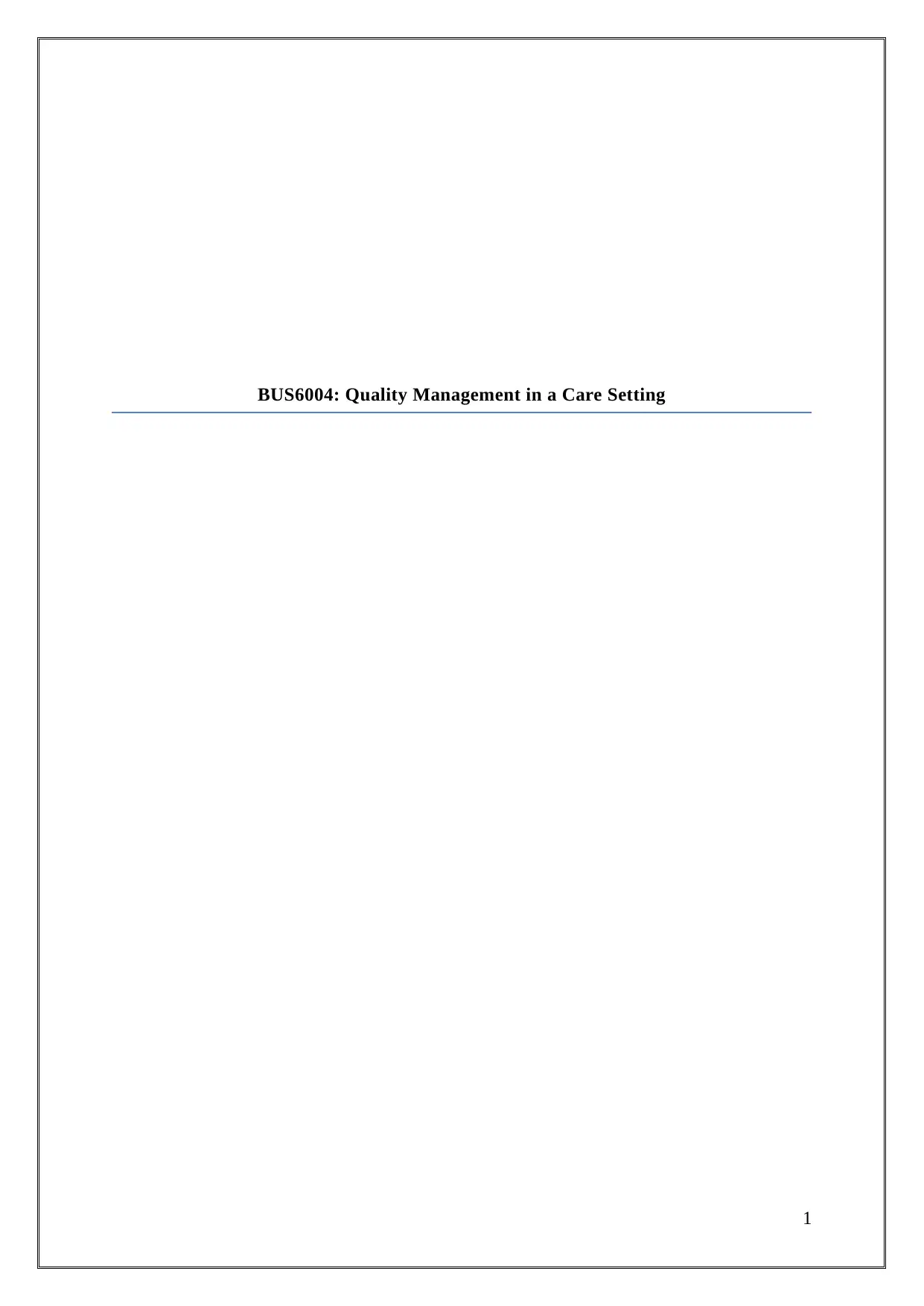
BUS6004: Quality Management in a Care Setting
1
1
Paraphrase This Document
Need a fresh take? Get an instant paraphrase of this document with our AI Paraphraser
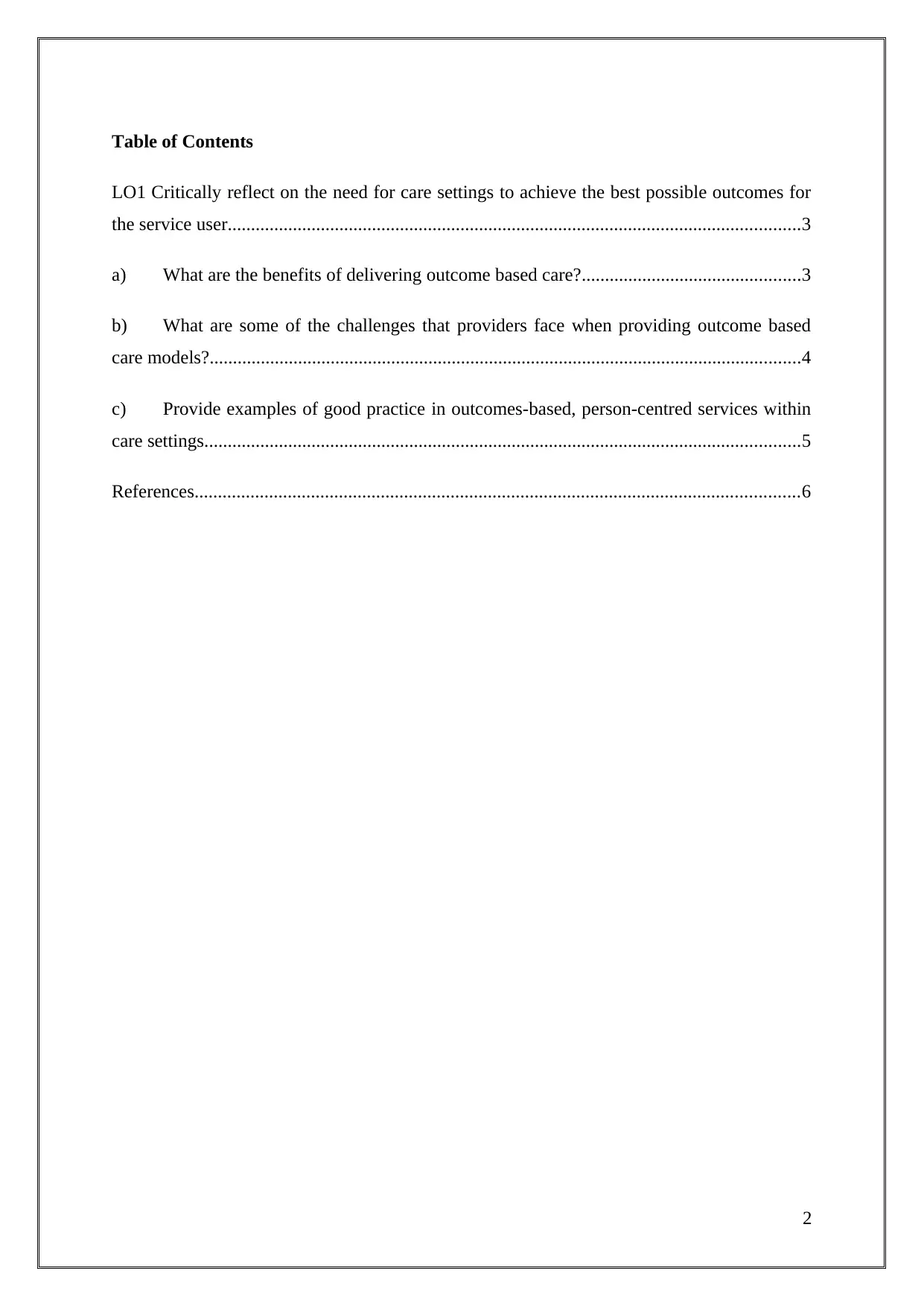
Table of Contents
LO1 Critically reflect on the need for care settings to achieve the best possible outcomes for
the service user...........................................................................................................................3
a) What are the benefits of delivering outcome based care?...............................................3
b) What are some of the challenges that providers face when providing outcome based
care models?...............................................................................................................................4
c) Provide examples of good practice in outcomes-based, person-centred services within
care settings................................................................................................................................5
References..................................................................................................................................6
2
LO1 Critically reflect on the need for care settings to achieve the best possible outcomes for
the service user...........................................................................................................................3
a) What are the benefits of delivering outcome based care?...............................................3
b) What are some of the challenges that providers face when providing outcome based
care models?...............................................................................................................................4
c) Provide examples of good practice in outcomes-based, person-centred services within
care settings................................................................................................................................5
References..................................................................................................................................6
2
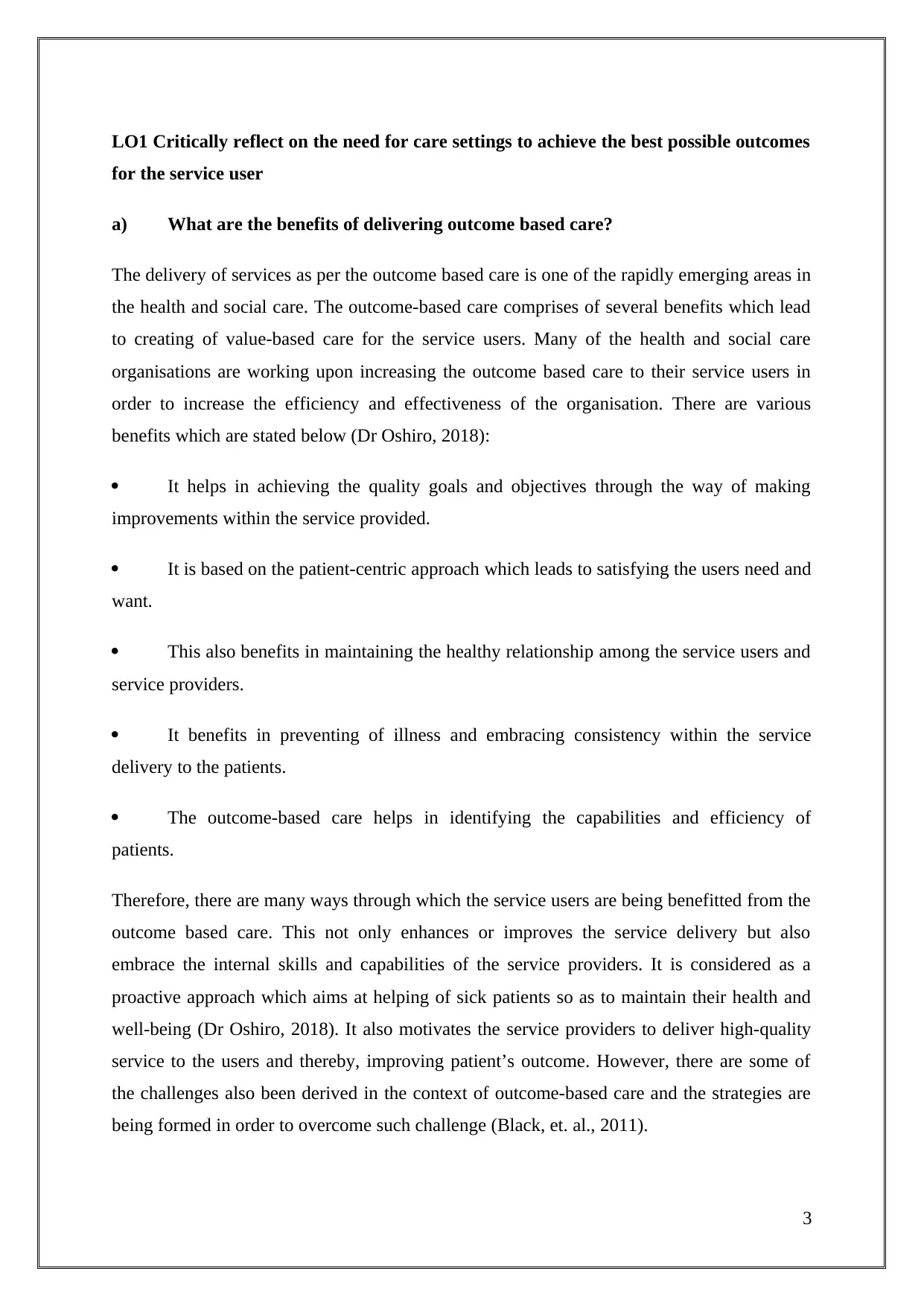
LO1 Critically reflect on the need for care settings to achieve the best possible outcomes
for the service user
a) What are the benefits of delivering outcome based care?
The delivery of services as per the outcome based care is one of the rapidly emerging areas in
the health and social care. The outcome-based care comprises of several benefits which lead
to creating of value-based care for the service users. Many of the health and social care
organisations are working upon increasing the outcome based care to their service users in
order to increase the efficiency and effectiveness of the organisation. There are various
benefits which are stated below (Dr Oshiro, 2018):
It helps in achieving the quality goals and objectives through the way of making
improvements within the service provided.
It is based on the patient-centric approach which leads to satisfying the users need and
want.
This also benefits in maintaining the healthy relationship among the service users and
service providers.
It benefits in preventing of illness and embracing consistency within the service
delivery to the patients.
The outcome-based care helps in identifying the capabilities and efficiency of
patients.
Therefore, there are many ways through which the service users are being benefitted from the
outcome based care. This not only enhances or improves the service delivery but also
embrace the internal skills and capabilities of the service providers. It is considered as a
proactive approach which aims at helping of sick patients so as to maintain their health and
well-being (Dr Oshiro, 2018). It also motivates the service providers to deliver high-quality
service to the users and thereby, improving patient’s outcome. However, there are some of
the challenges also been derived in the context of outcome-based care and the strategies are
being formed in order to overcome such challenge (Black, et. al., 2011).
3
for the service user
a) What are the benefits of delivering outcome based care?
The delivery of services as per the outcome based care is one of the rapidly emerging areas in
the health and social care. The outcome-based care comprises of several benefits which lead
to creating of value-based care for the service users. Many of the health and social care
organisations are working upon increasing the outcome based care to their service users in
order to increase the efficiency and effectiveness of the organisation. There are various
benefits which are stated below (Dr Oshiro, 2018):
It helps in achieving the quality goals and objectives through the way of making
improvements within the service provided.
It is based on the patient-centric approach which leads to satisfying the users need and
want.
This also benefits in maintaining the healthy relationship among the service users and
service providers.
It benefits in preventing of illness and embracing consistency within the service
delivery to the patients.
The outcome-based care helps in identifying the capabilities and efficiency of
patients.
Therefore, there are many ways through which the service users are being benefitted from the
outcome based care. This not only enhances or improves the service delivery but also
embrace the internal skills and capabilities of the service providers. It is considered as a
proactive approach which aims at helping of sick patients so as to maintain their health and
well-being (Dr Oshiro, 2018). It also motivates the service providers to deliver high-quality
service to the users and thereby, improving patient’s outcome. However, there are some of
the challenges also been derived in the context of outcome-based care and the strategies are
being formed in order to overcome such challenge (Black, et. al., 2011).
3
⊘ This is a preview!⊘
Do you want full access?
Subscribe today to unlock all pages.

Trusted by 1+ million students worldwide
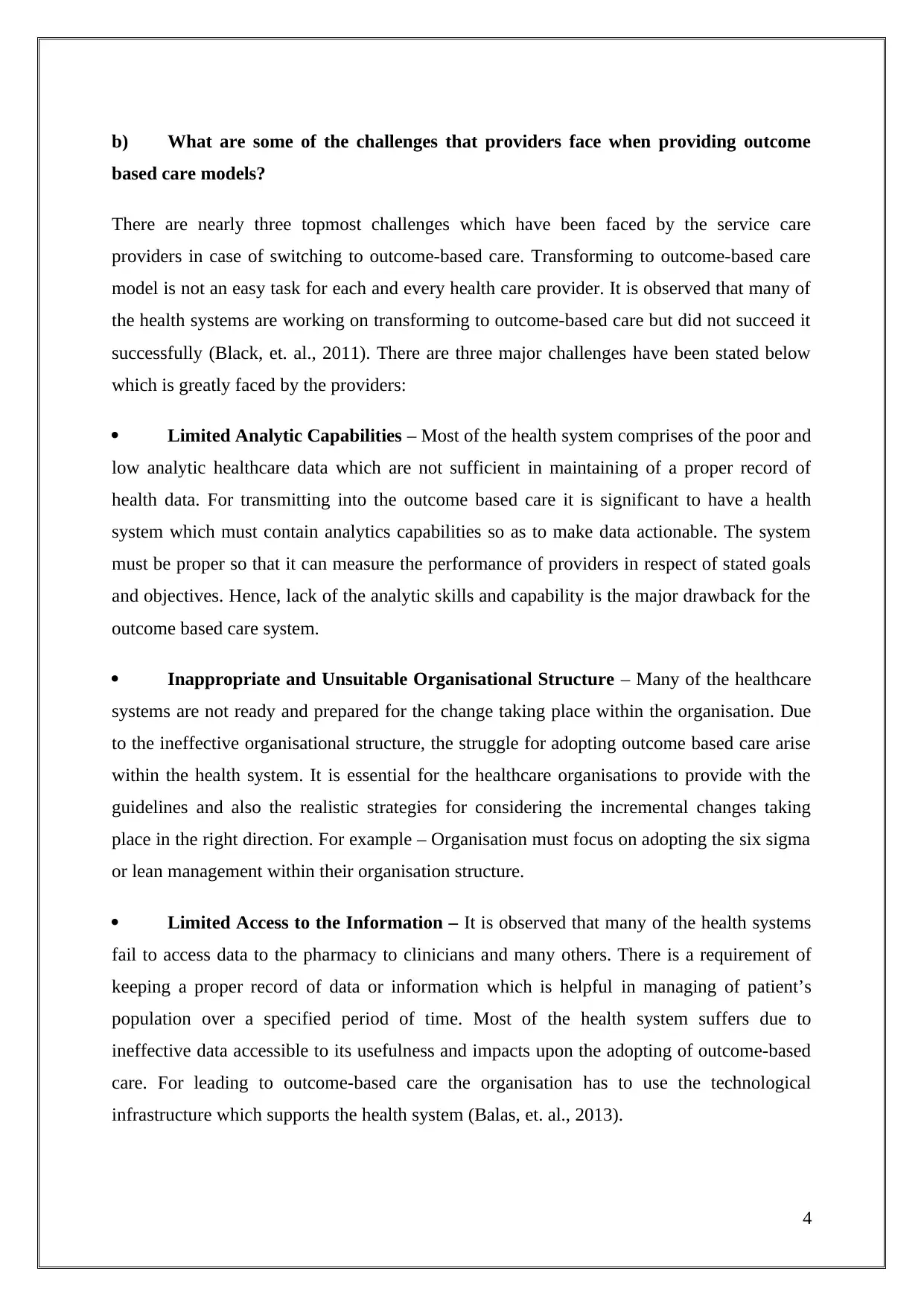
b) What are some of the challenges that providers face when providing outcome
based care models?
There are nearly three topmost challenges which have been faced by the service care
providers in case of switching to outcome-based care. Transforming to outcome-based care
model is not an easy task for each and every health care provider. It is observed that many of
the health systems are working on transforming to outcome-based care but did not succeed it
successfully (Black, et. al., 2011). There are three major challenges have been stated below
which is greatly faced by the providers:
Limited Analytic Capabilities – Most of the health system comprises of the poor and
low analytic healthcare data which are not sufficient in maintaining of a proper record of
health data. For transmitting into the outcome based care it is significant to have a health
system which must contain analytics capabilities so as to make data actionable. The system
must be proper so that it can measure the performance of providers in respect of stated goals
and objectives. Hence, lack of the analytic skills and capability is the major drawback for the
outcome based care system.
Inappropriate and Unsuitable Organisational Structure – Many of the healthcare
systems are not ready and prepared for the change taking place within the organisation. Due
to the ineffective organisational structure, the struggle for adopting outcome based care arise
within the health system. It is essential for the healthcare organisations to provide with the
guidelines and also the realistic strategies for considering the incremental changes taking
place in the right direction. For example – Organisation must focus on adopting the six sigma
or lean management within their organisation structure.
Limited Access to the Information – It is observed that many of the health systems
fail to access data to the pharmacy to clinicians and many others. There is a requirement of
keeping a proper record of data or information which is helpful in managing of patient’s
population over a specified period of time. Most of the health system suffers due to
ineffective data accessible to its usefulness and impacts upon the adopting of outcome-based
care. For leading to outcome-based care the organisation has to use the technological
infrastructure which supports the health system (Balas, et. al., 2013).
4
based care models?
There are nearly three topmost challenges which have been faced by the service care
providers in case of switching to outcome-based care. Transforming to outcome-based care
model is not an easy task for each and every health care provider. It is observed that many of
the health systems are working on transforming to outcome-based care but did not succeed it
successfully (Black, et. al., 2011). There are three major challenges have been stated below
which is greatly faced by the providers:
Limited Analytic Capabilities – Most of the health system comprises of the poor and
low analytic healthcare data which are not sufficient in maintaining of a proper record of
health data. For transmitting into the outcome based care it is significant to have a health
system which must contain analytics capabilities so as to make data actionable. The system
must be proper so that it can measure the performance of providers in respect of stated goals
and objectives. Hence, lack of the analytic skills and capability is the major drawback for the
outcome based care system.
Inappropriate and Unsuitable Organisational Structure – Many of the healthcare
systems are not ready and prepared for the change taking place within the organisation. Due
to the ineffective organisational structure, the struggle for adopting outcome based care arise
within the health system. It is essential for the healthcare organisations to provide with the
guidelines and also the realistic strategies for considering the incremental changes taking
place in the right direction. For example – Organisation must focus on adopting the six sigma
or lean management within their organisation structure.
Limited Access to the Information – It is observed that many of the health systems
fail to access data to the pharmacy to clinicians and many others. There is a requirement of
keeping a proper record of data or information which is helpful in managing of patient’s
population over a specified period of time. Most of the health system suffers due to
ineffective data accessible to its usefulness and impacts upon the adopting of outcome-based
care. For leading to outcome-based care the organisation has to use the technological
infrastructure which supports the health system (Balas, et. al., 2013).
4
Paraphrase This Document
Need a fresh take? Get an instant paraphrase of this document with our AI Paraphraser
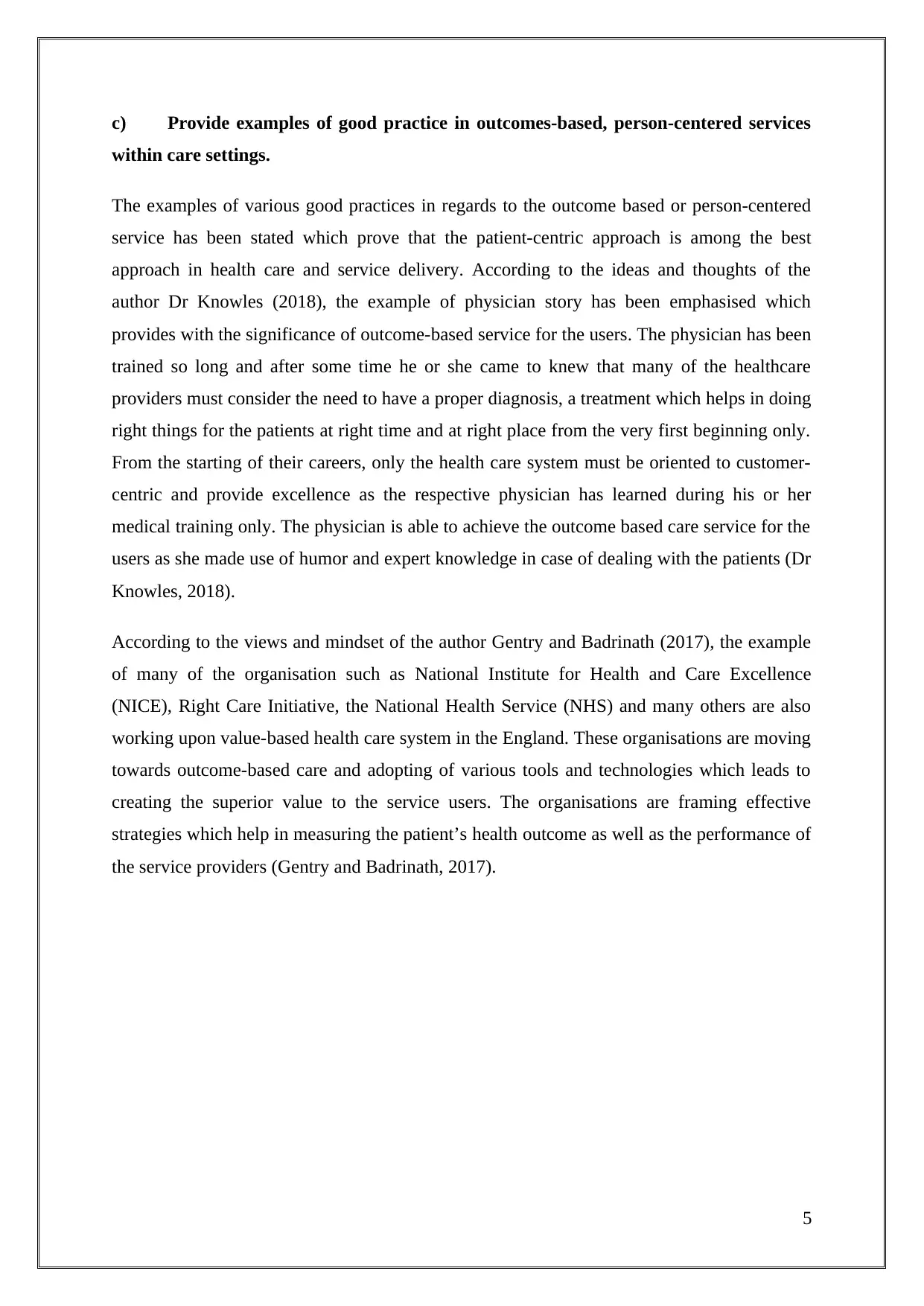
c) Provide examples of good practice in outcomes-based, person-centered services
within care settings.
The examples of various good practices in regards to the outcome based or person-centered
service has been stated which prove that the patient-centric approach is among the best
approach in health care and service delivery. According to the ideas and thoughts of the
author Dr Knowles (2018), the example of physician story has been emphasised which
provides with the significance of outcome-based service for the users. The physician has been
trained so long and after some time he or she came to knew that many of the healthcare
providers must consider the need to have a proper diagnosis, a treatment which helps in doing
right things for the patients at right time and at right place from the very first beginning only.
From the starting of their careers, only the health care system must be oriented to customer-
centric and provide excellence as the respective physician has learned during his or her
medical training only. The physician is able to achieve the outcome based care service for the
users as she made use of humor and expert knowledge in case of dealing with the patients (Dr
Knowles, 2018).
According to the views and mindset of the author Gentry and Badrinath (2017), the example
of many of the organisation such as National Institute for Health and Care Excellence
(NICE), Right Care Initiative, the National Health Service (NHS) and many others are also
working upon value-based health care system in the England. These organisations are moving
towards outcome-based care and adopting of various tools and technologies which leads to
creating the superior value to the service users. The organisations are framing effective
strategies which help in measuring the patient’s health outcome as well as the performance of
the service providers (Gentry and Badrinath, 2017).
5
within care settings.
The examples of various good practices in regards to the outcome based or person-centered
service has been stated which prove that the patient-centric approach is among the best
approach in health care and service delivery. According to the ideas and thoughts of the
author Dr Knowles (2018), the example of physician story has been emphasised which
provides with the significance of outcome-based service for the users. The physician has been
trained so long and after some time he or she came to knew that many of the healthcare
providers must consider the need to have a proper diagnosis, a treatment which helps in doing
right things for the patients at right time and at right place from the very first beginning only.
From the starting of their careers, only the health care system must be oriented to customer-
centric and provide excellence as the respective physician has learned during his or her
medical training only. The physician is able to achieve the outcome based care service for the
users as she made use of humor and expert knowledge in case of dealing with the patients (Dr
Knowles, 2018).
According to the views and mindset of the author Gentry and Badrinath (2017), the example
of many of the organisation such as National Institute for Health and Care Excellence
(NICE), Right Care Initiative, the National Health Service (NHS) and many others are also
working upon value-based health care system in the England. These organisations are moving
towards outcome-based care and adopting of various tools and technologies which leads to
creating the superior value to the service users. The organisations are framing effective
strategies which help in measuring the patient’s health outcome as well as the performance of
the service providers (Gentry and Badrinath, 2017).
5
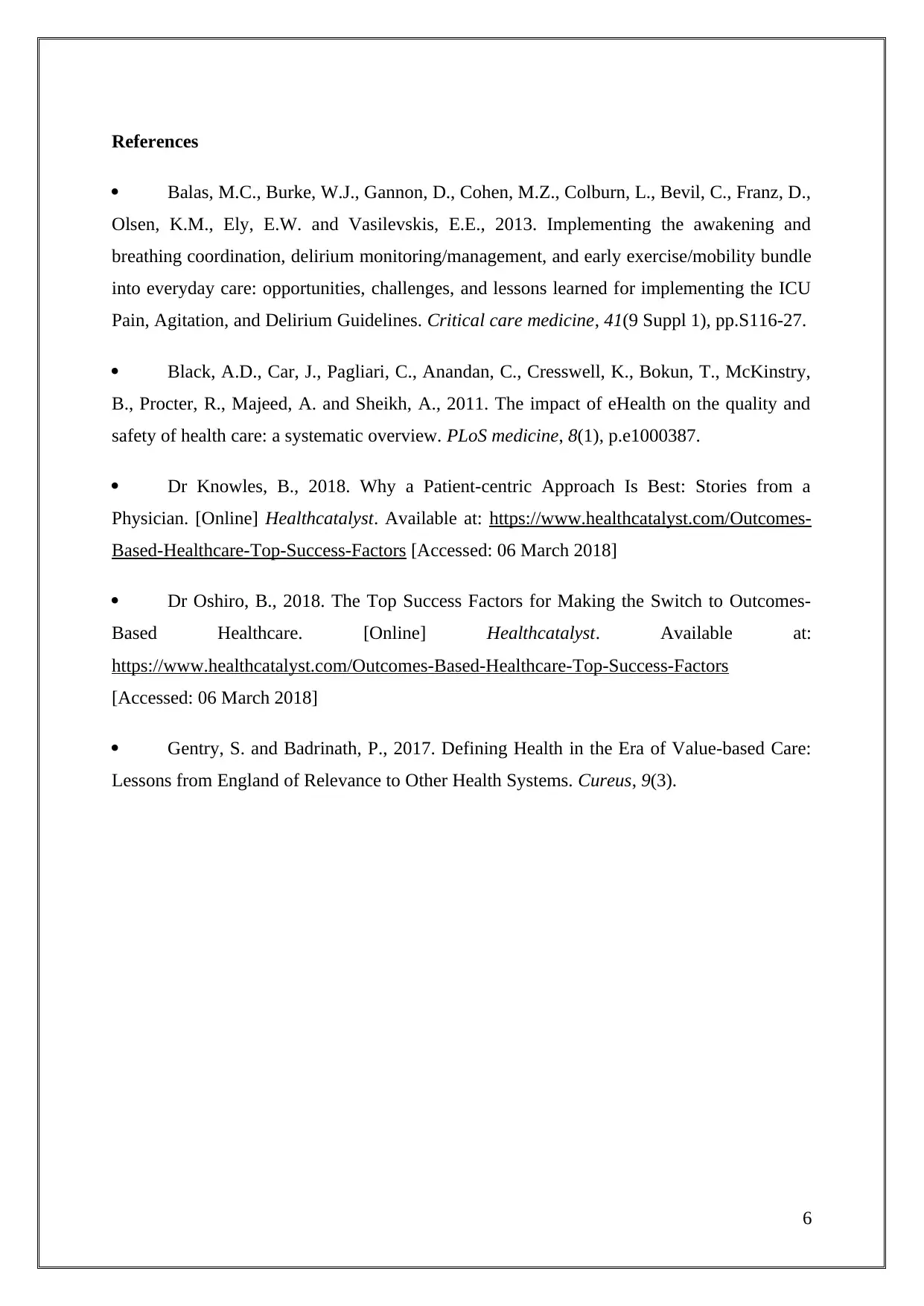
References
Balas, M.C., Burke, W.J., Gannon, D., Cohen, M.Z., Colburn, L., Bevil, C., Franz, D.,
Olsen, K.M., Ely, E.W. and Vasilevskis, E.E., 2013. Implementing the awakening and
breathing coordination, delirium monitoring/management, and early exercise/mobility bundle
into everyday care: opportunities, challenges, and lessons learned for implementing the ICU
Pain, Agitation, and Delirium Guidelines. Critical care medicine, 41(9 Suppl 1), pp.S116-27.
Black, A.D., Car, J., Pagliari, C., Anandan, C., Cresswell, K., Bokun, T., McKinstry,
B., Procter, R., Majeed, A. and Sheikh, A., 2011. The impact of eHealth on the quality and
safety of health care: a systematic overview. PLoS medicine, 8(1), p.e1000387.
Dr Knowles, B., 2018. Why a Patient-centric Approach Is Best: Stories from a
Physician. [Online] Healthcatalyst. Available at: https://www.healthcatalyst.com/Outcomes-
Based-Healthcare-Top-Success-Factors [Accessed: 06 March 2018]
Dr Oshiro, B., 2018. The Top Success Factors for Making the Switch to Outcomes-
Based Healthcare. [Online] Healthcatalyst. Available at:
https://www.healthcatalyst.com/Outcomes-Based-Healthcare-Top-Success-Factors
[Accessed: 06 March 2018]
Gentry, S. and Badrinath, P., 2017. Defining Health in the Era of Value-based Care:
Lessons from England of Relevance to Other Health Systems. Cureus, 9(3).
6
Balas, M.C., Burke, W.J., Gannon, D., Cohen, M.Z., Colburn, L., Bevil, C., Franz, D.,
Olsen, K.M., Ely, E.W. and Vasilevskis, E.E., 2013. Implementing the awakening and
breathing coordination, delirium monitoring/management, and early exercise/mobility bundle
into everyday care: opportunities, challenges, and lessons learned for implementing the ICU
Pain, Agitation, and Delirium Guidelines. Critical care medicine, 41(9 Suppl 1), pp.S116-27.
Black, A.D., Car, J., Pagliari, C., Anandan, C., Cresswell, K., Bokun, T., McKinstry,
B., Procter, R., Majeed, A. and Sheikh, A., 2011. The impact of eHealth on the quality and
safety of health care: a systematic overview. PLoS medicine, 8(1), p.e1000387.
Dr Knowles, B., 2018. Why a Patient-centric Approach Is Best: Stories from a
Physician. [Online] Healthcatalyst. Available at: https://www.healthcatalyst.com/Outcomes-
Based-Healthcare-Top-Success-Factors [Accessed: 06 March 2018]
Dr Oshiro, B., 2018. The Top Success Factors for Making the Switch to Outcomes-
Based Healthcare. [Online] Healthcatalyst. Available at:
https://www.healthcatalyst.com/Outcomes-Based-Healthcare-Top-Success-Factors
[Accessed: 06 March 2018]
Gentry, S. and Badrinath, P., 2017. Defining Health in the Era of Value-based Care:
Lessons from England of Relevance to Other Health Systems. Cureus, 9(3).
6
⊘ This is a preview!⊘
Do you want full access?
Subscribe today to unlock all pages.

Trusted by 1+ million students worldwide
1 out of 6
Related Documents
Your All-in-One AI-Powered Toolkit for Academic Success.
+13062052269
info@desklib.com
Available 24*7 on WhatsApp / Email
![[object Object]](/_next/static/media/star-bottom.7253800d.svg)
Unlock your academic potential
Copyright © 2020–2026 A2Z Services. All Rights Reserved. Developed and managed by ZUCOL.




